A World Bank report says the Somali government has not accounted for most of the revenues and donations it received in 2009 and 2010.
The report, released this week, says World Bank auditors found that Somalia's Transitional Federal Government (TFG) received far more money than it has said.
The report's author, Joakim Gundel, said auditors found the government had collected at least $94 million in revenues in 2009. But the government reported only $11 million in revenues.
In 2010, auditors found the government collected $70 million in revenues, while the government reported just $22 million.
“There is a discrepancy in what comes in and there’s a lack of accounting of how money has been spent," said Gundel. "So that opens naturally a big question mark for sure."
Gundel said discrepancies appear to back assertions made one year ago by a Somali government whistleblower.
The former chief of Somalia's public finance unit, Abdirizak Fartaag, said an audit found strong evidence of mismanagement and misappropriation of funds.
The World Bank report said not all revenues and donated funds are deposited in the central bank, and it is not clear where they go.
“What we did observe is that in relationship to the bilateral funds, donations often they are given directly to individual government members and do not exactly specify exactly who and how," said Fartaag. "But such donations appear to have happened. But we did find and did make observations that this money is not fully deposted in the central bank, sometimes it’s only partly.
The report found the United Nations-backed government has no real accounting system nor does it publicly disclose financial statements. It also said the weak transitonal government lacks transparency, making it difficult for auditors to fully assess the country's finances.
Gundel said the unaccounted for money could significantly bolsters Somalia's security without relying on foreign donations.
The weak transitional government has received significant foreign aid and donations to help it address persistent conflict, instability, poverty, food shortages and an insurgency by al-Shabab militants.
Under a U.N.-brokered roadmap, Somalia is to form a post-transition government. The plan calls for the adoption of a new constitution by July 1 and parliamentary elections to be held on August 20.
Somalia has not had a stable central government in more than 20 years, since warlords overthrew President Mohamed Siad Barre.
The report, released this week, says World Bank auditors found that Somalia's Transitional Federal Government (TFG) received far more money than it has said.
The report's author, Joakim Gundel, said auditors found the government had collected at least $94 million in revenues in 2009. But the government reported only $11 million in revenues.
In 2010, auditors found the government collected $70 million in revenues, while the government reported just $22 million.
“There is a discrepancy in what comes in and there’s a lack of accounting of how money has been spent," said Gundel. "So that opens naturally a big question mark for sure."
Gundel said discrepancies appear to back assertions made one year ago by a Somali government whistleblower.
The former chief of Somalia's public finance unit, Abdirizak Fartaag, said an audit found strong evidence of mismanagement and misappropriation of funds.
The World Bank report said not all revenues and donated funds are deposited in the central bank, and it is not clear where they go.
“What we did observe is that in relationship to the bilateral funds, donations often they are given directly to individual government members and do not exactly specify exactly who and how," said Fartaag. "But such donations appear to have happened. But we did find and did make observations that this money is not fully deposted in the central bank, sometimes it’s only partly.
The report found the United Nations-backed government has no real accounting system nor does it publicly disclose financial statements. It also said the weak transitonal government lacks transparency, making it difficult for auditors to fully assess the country's finances.
Gundel said the unaccounted for money could significantly bolsters Somalia's security without relying on foreign donations.
The weak transitional government has received significant foreign aid and donations to help it address persistent conflict, instability, poverty, food shortages and an insurgency by al-Shabab militants.
Under a U.N.-brokered roadmap, Somalia is to form a post-transition government. The plan calls for the adoption of a new constitution by July 1 and parliamentary elections to be held on August 20.
Somalia has not had a stable central government in more than 20 years, since warlords overthrew President Mohamed Siad Barre.
